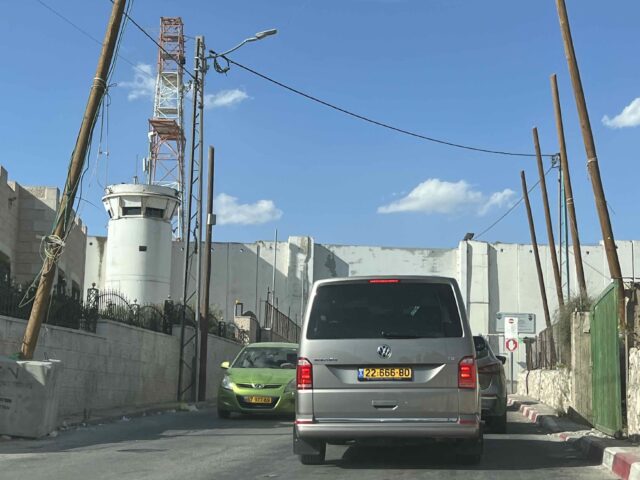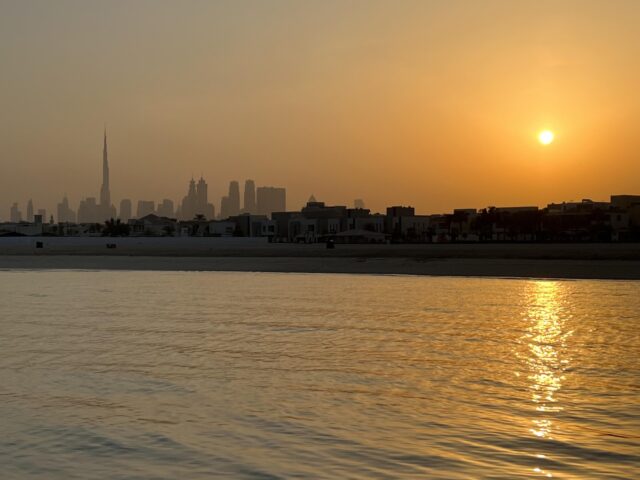This is the third in a three-part series. See parts one and two.
DUBAI, United Arab Emirates — On Monday, I was stuck waiting behind a checkpoint at the security barrier in the Palestinian city of Bethlehem.

Cars wait to enter Israel on the Palestinian side of a checkpoint in the security barrier at Bethlehem. Sep. 11, 2023 (Joel Pollak / Breitbart News)
By Wednesday, I was skiing on an artificial indoor mountain with Arab teenagers in Dubai.

A snowboarder swoops down the slope of an artificial mountain at Ski Dubai, at the Mall of the Emirates. Sep. 13, 2023 (Joel Pollak / Breitbart News)
These two experiences are a contrast of two realities in the Arab world, but also reveal the difference in the choices Arab leaders have made: to look backward, to conflict; or to look forward, to partnership and prosperity.
I was in Bethlehem because I wanted to visit the Christian holy sites, as I had done 15 years ago. No sooner had my tour bus entered the city, however, than I was told by our bus driver to put a hat on, to cover my kippah, the round head covering worn by observant Jewish men.
It was dangerous, in the “city of peace,” known for the birth of a Jew, for a Jew to be seen openly moving through the streets, at least under the leadership of the Palestinian Authority.
I decided to return to Jerusalem, and I was offered a ride by a kind Christian Arab, who had Israeli citizenship and could therefore drive back and forth across the checkpoint. But as the minutes ticked by, and the rush-hour traffic ahead on our GPS grew more intense, the situation became more intolerable.
I did not blame Israel, or the soldiers who checked our papers. I blamed the Palestinian leadership, for allowing the violence that made this necessary.
The following day, I flew to Abu Dhabi, capital of the United Arab Emirates, to visit the Abrahamic Family House, a new interfaith religious facility that also happens to house the first official, recognized synagogue in the country. It is so beautiful that it moved me to tears.
I found myself discussing Maimonides with the young Muslim woman who was our guide. A family of Pakistani Christians, excited to meet their first Jew, took selfies with me in the mosque.
At dusk, I drove to Dubai, a city I had always wanted to visit but would not, or could not, while the country refused entry to Israelis, and hence Jews. The Abraham Accords changed all of that, and inaugurated a new era of travel, trade, and investment.
Today, Emiratis visit Tel Aviv and visit the Al Aqsa Mosque; Israelis shop at the Dubai Mall and enjoy kosher food at the Armani hotel in the Burj Kahalifa. Hundreds of Jewish families now call Dubai home.
Traveling with a group from Canada’s Rebel News, I met a prominent Emirati, Ahmed Obaid Al Mansoori, who had taken an interest in religious artifacts from all three monotheistic faiths, and who has opened the first Holocaust museum in the Arab world. He is passionate about building a more peaceful region. He understands the Israeli-Palestinian issue, and even has a collection of maps from pre-1948 Palestine, but wants to move forward, not back.
Last week, Palestinian Authority Chairman Mahmoud Abbas was discovered — once again — to have delivered an antisemitic diatribe. He will continue to receive generous American aid from a Democratic administration anyway.
But what a contrast between his words and those of Emirati leader Sheikh Mohammed bin Rashid Al Maktoum, as displayed in the Burj Khalifa, the world’s tallest building: “The word impossible is not in the leaders’ dictionaries.”
The Emirati leaders certainly applied that principle to their own country, which they have raised out of the sandy plain into towers of gleaming steel. But they also applied that principle in crafting a peace agreement with Israel, which has opened a world of limitless opportunities.
The Palestinian leadership is the main obstacle to peace in the region. But Abbas will not be around forever. Hopefully, when he is gone, the Palestinian people can choose wisely.
Joel B. Pollak is Senior Editor-at-Large at Breitbart News and the host of Breitbart News Sunday on Sirius XM Patriot on Sunday evenings from 7 p.m. to 10 p.m. ET (4 p.m. to 7 p.m. PT). He is the author of the new biography, Rhoda: ‘Comrade Kadalie, You Are Out of Order’. He is also the author of the recent e-book, Neither Free nor Fair: The 2020 U.S. Presidential Election. He is a winner of the 2018 Robert Novak Journalism Alumni Fellowship. Follow him on Twitter at @joelpollak.

COMMENTS
Please let us know if you're having issues with commenting.